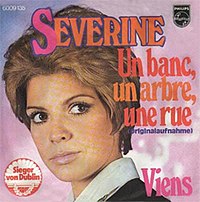Un banc, un arbre, une rue
|
|
|
|---|---|
 |
|
| Eurovision Song Contest 1971 entry | |
| Country | |
| Artist(s) |
Josiane Grizeau
|
| As | |
| Language | |
| Composer(s) |
Jean-Pierre Bourtayre
|
| Lyricist(s) |
Yves Dessca
|
| Conductor |
Jean Claude Petit
|
| Finals performance | |
| Final result |
1st
|
| Final points |
128
|
| Appearance chronology | |
| ◄ "Marlène" (1970) | |
| "Comme on s'aime" (1972) ► | |
"Un banc, un arbre, une rue" ("A Bench, a Tree, a Street") was the winning song of the Eurovision Song Contest 1971 performed in French by French singer Séverine, representing Monaco.
The song is a classic French ballad, with the lyric focusing on the loss of childhood innocence, and people following their dreams. The opening lines to the chorus translate as "We all have a bench, a tree, a street/Where we cherished our dreams/A childhood that has been too short".
Four teenage male backup singers provided accompaniment. During Preview Week, Séverine sang the song in the empty square of Monte Carlo, first walking to a bench, then sitting down while performing the middle verses, and then ending the song by walking away out of camera focus.
The song received the maximum score of 10 points (currently 12 points) from six voting nations. This song holds the record of receiving the most 10 point scores from this voting era.
"Un banc, un arbre, une rue" was performed third on the night, following Malta's Joe Grech with "Marija l-Maltija" and preceding Switzerland's Peter, Sue & Marc with "Les illusions de nos vingt ans". By the close of voting, it had received 128 points, placing it first in a field of 18.
Séverine recorded the song in four languages; French, English (as "Chance in Time"), German ("Mach' die Augen zu (und wünsch dir einen Traum)") and Italian ("Il posto").
The song was succeeded as contest winner in 1972 by Vicky Leandros singing "Après toi" for Luxembourg.
...
Wikipedia
